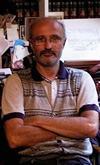
Introducing Fabrizio Eva
Fabrizio Eva (Carrara, 1949) is professor in Political and Economic Geography at the University of Cà Foscari Venice, Treviso Campus. He is specialised in East Asia, dynamic geopolitics and geopolitical crisis. Professor Eva holds a degree in Italian Modern Literature, specialization Geography and History.
Geopolitical Passport
Your relationship with geopolitics
At what age did you discover geopolitics and what attracted you to it?
I discovered politics when I was 17 and attended high school. During the first half of the 1970s, geopolitical topics were an everyday arguments for my generation.
Which geopolitical topics have your focus and why did you choose especially these?
China and East Asia in general; I started from the esthetical appreciation for the Japanese and Chinese art, then I studied history and culture.
Second topic: geopolitical dynamics and crisis areas; I was and still am unsatisfied by the “narratives” and the “discourse” about it and I’d like to be a sort of countervoice against the so-called clash of civilizations theory and against the mental attitude of I.R. experts (unfortunately so similar to the one of the decision makers).
What do you consider your most important contribution to geopolitics?
My article “Caging/self-caging: materiality and memes as tools for geopolitical analysis” in Human Geography (2012).
(Editor’s note: this answer was provided in March 2013)
My geopolitical preferences
What is your favourite definition of geopolitics?
Geopolitics: how human groups (or single ones) act politically in a defined territory.
Which geopolitical scientist do you admire the most?
John Agnew (for the concept of “territorial trap”), Gerald Toal (for his critical geopolitical analysis) and David Newman (for his reasonings about shared/divided spaces).
What is your favourite geopolitical book?
The ones of the above mentioned geopoliticians.
What is your favourite geopolitical website?
I haven’t one. I pick up information from websites of geostrategic study centres and others such as:
I also visit many newspapers on the web. I use mainly “ordinary news” of the mainstream press and TV for my research because this is the main source for ordinary people, giving it a significant influence on ideas and mental attitudes of the population.
Finally, I consider the imagines of Google Earth a very useful “geopolitical” aid.
The geopolitical future
In what direction(s) will geopolitical science be heading the coming decades?
It’s my wish: to be able to give good suggestions in order to solve conflicts and geopolitical crisis.
Which geopolitical subject has been too little in the spotlight and needs further research?
How the human psychology affect the use and the “production” of space. There are too many theories and philosophy; these could hide the simple necessities and social relations of human beings.
What will be the largest geopolitical challenge for the world in the 21st century?
To stop the shift toward hierarchic/pyramidal societies in the name of “security”.
